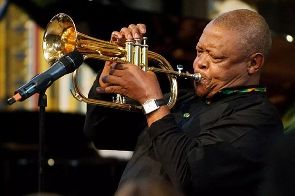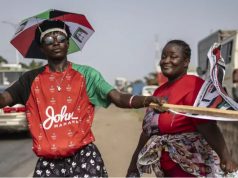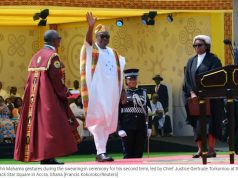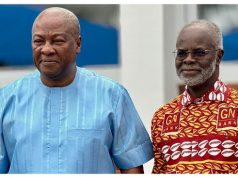The President of Ghana, Nana Addo Dankwa Akufo-Addo has paid a glowing tribute to the late South African legend, Hugh Masekela, in which he recalls his personal bond with the global music icon who died January 23, 2018, at the age of 78.
His decision to attend Masekela’s funeral opened up a wave of criticism in political and governance circles especially as it left the presidency with the Speaker of Parliament in charge while Vice President Mahamudu Bawumia is on medical vacation in London.
But in the tribute detailing several moments they shared together, Nana Addo insists “I had to come”.
Below is the full tribute by Nana Addo.
*Tribute by The President of the Republic Of Ghana, Nana Addo Dankwa Akufo-Addo, At The Funeral Of Hugh Masakela, On Tuesday, 30th January, 2018, In Johannesburg, South Africa*
I had to come and came from the AU Summit in Addis Ababa on my way back home to Accra, so I could express my condolences to Barbara and his family in person.
Coming here, it was difficult to believe the news. But being here, at this service, it is clear to me that the news is, indeed, true. Masakela is gone, Masakela is no more.
All that energy, all that vitality, all that zest for life, (what the French call joie de vivre), all that infectious sense of humour, all that loud laughter, all that love of beauty in all its forms, all that passion and belief in a higher destiny for mankind, especially for the African people, all that charisma – they have all been extinguished. That is the way of mortal man. We each have our beginning, we each have our ending. It is what you do in between that matters.
What an amazing life he lived, and did virtually everything he wanted to do. We met a long time ago, nearly 50 years ago. Predictably, for both of us at the time, it was at the bar of Keteke, then the hottest night club (or disco, as they were then being called) in Accra.
He was already a legend – “King Kong”, and “Grazing in the Grass” had seen to that. But, he wore none of that. Simple, straightforward, he exuded fun and warmth. Many drinks later, we became firm friends, and looked out for and saw each other at various clubs across the world – New York, London, Paris, Lagos, Abidjan, Lome – wherever we were together, we would meet and party.
Nobody partied like Masakela. From the beginning, that is what I called him – Masakela – and he called me Nana. It never changed. For some reason, I could never come to terms with Hugh or Bra Hugh. He was Masakela, unique and compelling.
He bore his exile with dignity. He never lost his belief that the inhuman system of apartheid would be dismantled, and that South Africa would, one day, be free. And he did his best to ensure that happened. He was one of the most prominent of the South African exiles, who kept the struggle alive before the eyes and conscience of the world, and he did it largely through his wonderful music.
Trumpet, cornet, flugelhorn, his voice – he made beautiful music out of each of them. And when his idol, the iconic Nelson Mandela, greatest of all Africans, walked out of prison, his joy was without end.
I came here to visit with him when he returned home, and that was my first experience of South Africa. He took me to the recording studio in downtown Johannesburg, where he had recorded in the old days with Dollar Brand (Abdullah Ibrahim), and the others. In fact, on the day we went, the new diva, Sibongile Khumalo, was actually in the studio, and he introduced me to her.
I was fortunate in my friendship with him and his great friend, that other great figure of African music, Fela Anikulapo Kuti (Fela Ransome Kuti of earlier years).
They made exhilarating company, and left me with marvellous memories. One such was at dawn, in Lome, capital of Togo, when, after leaving the nightclub ‘Z’, we went to the beach, behind the Sarakawa Hotel, and, sitting on the shores of the Gulf of Guinea, looking out across the Atlantic, Masakela played for us for one hour.
It was like a song of praise to all that was beautiful on our African continent. Even Fela was moved, and every time I think of it, it brings tears of joy to my heart.
His love of Ghana was such that he became a Ghanaian, and, for me, a member of my family. My wife Rebecca, my sister Mamaa, her daughter Khadija, my brother Bumpty, his wife Irene, our mutual friend Sabah Bedwei Majdoub, Joe Ampah, his widow Rosalind, and the talented Accra musicians – Francis Fuster, The Todd brothers, Frankie and Stanley Todd, Sol Amarfio, the late Faisal Helwani, the outstanding Ghanaian music producer – we were all his family, to whom he remained faithful to the end.
He even married, for a time, the lovely Ghanaian woman, Elinam Cofie. South Africa will always have to share Masakela with us in Ghana, and, indeed, with the rest of Africa.
There are some people who cross your life, and you know that it is a privilege to share the same time and space with them. Masakela was one such. I feel truly privileged to have lived at the same time as him, and to have been blessed by his friendship.
Last year, he did what we had both talked and dreamed of for decades – he played at my inauguration, as President of the Republic of Ghana, on 7th January, 2017.
He played on two occasions that day – at the official lunch, and at the wonderful party my brother gave for me and my wife, Rebecca, that evening, both, unforgettable occasions.
Indeed, several diplomats told me, on the news of his death, that that was the first and only time they heard him in flesh, a memory they would always cherish.
I am reluctant to quote Shakespeare – he wrote some 500 years ago, and has since been extensively quoted. But the reason for that is his mastery of the English language, which allows him to find the appropriate words for each occasion. This is how Mark Anthony described Brutus, one of the conspirators against Julius Caesar:
“This was the noblest Roman of them all. All the rest of the conspirators acted out of jealousy of great Caesar. Only he acted from honesty and for the general good. His life was gentle, and the elements mixed so well in him that Nature might stand up and say to all the world, “This was a man.”
Masakela, you were the man. Rest in perfect peace. God bless.
Damirifa Due.
Nana.









